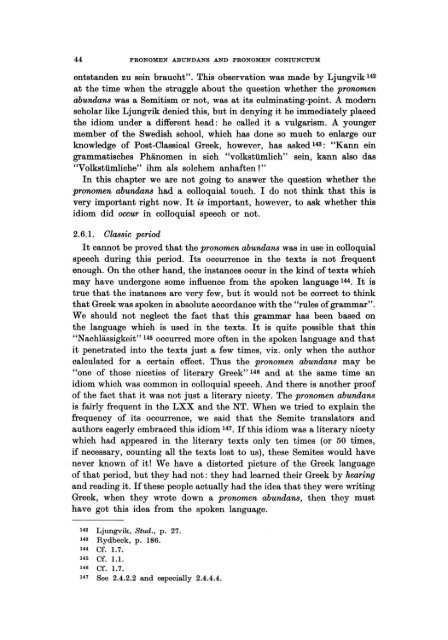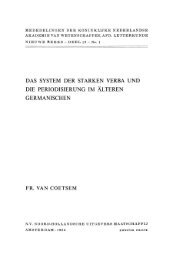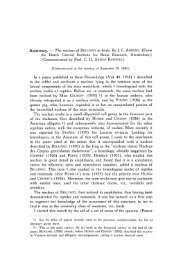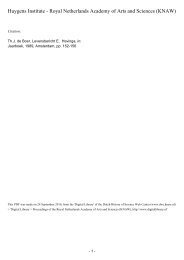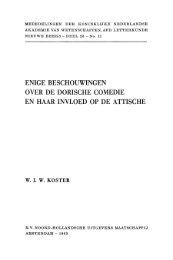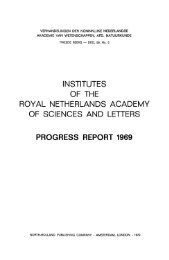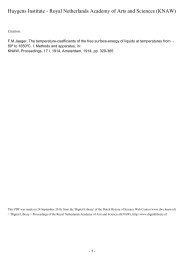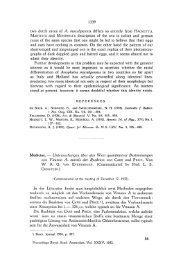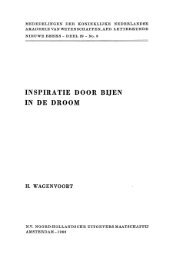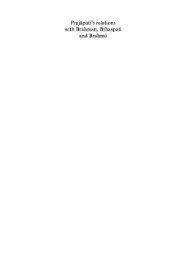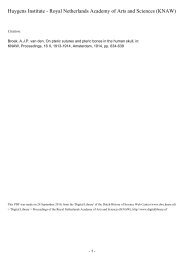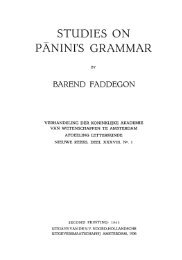Pronomen Abundans and Pronomen Coniunctum. A ... - DWC
Pronomen Abundans and Pronomen Coniunctum. A ... - DWC
Pronomen Abundans and Pronomen Coniunctum. A ... - DWC
You also want an ePaper? Increase the reach of your titles
YUMPU automatically turns print PDFs into web optimized ePapers that Google loves.
44 PRONOMEN ABUNDANS AND PRONOMEN CONIUNCTUM<br />
entst<strong>and</strong>en zu sein brauoht". This observation was made by Ljungvik 142<br />
at the time when the struggle about the question whether the pronomen<br />
abundans was a Semitism or not, was at its oulminating-point. A modern<br />
soholar like Ljungvik denied this, but in denying it he immediately plaoed<br />
the idiom under a different head: he called it a vulgarism. A younger<br />
member of the Swedish sohool, whioh has done so muoh to enlarge our<br />
knowledge of Post-Classioal Greek, however, has asked 143: "Kann ein<br />
grammatisohes Phänomen in sioh "volkstümlioh" sein, kann also das<br />
"Volkstümliohe" ihm als solohem anhaften 1"<br />
In this ohapter we are not going to answer the question whether the<br />
pronomen abundans had a oolloquial touch. I do not think that this is<br />
very important right now. It is important, however, to ask whether this<br />
idiom did occur in oolloquial speeoh or not.<br />
2.6.1. Olassic period<br />
It cannot be proved that the pronomen abundans was in use in oolloquial<br />
speech during this period. lts ooourrenoe in the texts is not frequent<br />
enough. On the other h<strong>and</strong>, the instances oocur in the kind of texts whioh<br />
may have undergone some influenoe from the spoken language 144. It is<br />
true that the instanoes are very few, but it would not be oorreot to think<br />
that Greek was spoken in absolute aooordanoe with the "rules of grammar" .<br />
We should not negleot the faot that this grammar has been based on<br />
the language whioh is used in the texts. It is quite possible that this<br />
"Nachlässigkeit" 145 ooourred more of ten in the spoken language <strong>and</strong> that<br />
it penetrated into the texts just a few times, viz. only when the author<br />
oaloulated for a oertain effeot. Thus the pronomen abundans may be<br />
"one of those nioeties of literary Greek" 146 <strong>and</strong> at the same time an<br />
idiom whioh was oommon in colloquial speeoh. And there is another proof<br />
of the faot that it was not just a literary nioety. The pronomen abundans<br />
is fairly frequent in the LXX <strong>and</strong> the NT. When we tried to explain the<br />
frequenoy of its ooourrenoe, we said that the Semite translators <strong>and</strong><br />
authors eagerly embraoed this idiom 147. If this idiom was a literary nicety<br />
whioh had appeared in the literary texts only ten times (or 50 times,<br />
if neoessary, oounting all the texts lost to us), these Semites would have<br />
never known of it! We have a distorted picture of the Greek language<br />
of that period, but they had not: they had learned their Greek by hearing<br />
<strong>and</strong> reading it. If these people actually had the idea that they were writing<br />
Greek, when they wrote down a pronomen abundans, then they must<br />
have got this idea from the spoken language.<br />
142 Ljungvik, Stud., p . 27.<br />
143 Rydbeck, p. 186.<br />
144 Cf. 1.7.<br />
145 Cf. 1.1.<br />
146 Cf. 1.7.<br />
147 See 2.4.2.2 <strong>and</strong> especially 2.4.4.4.


